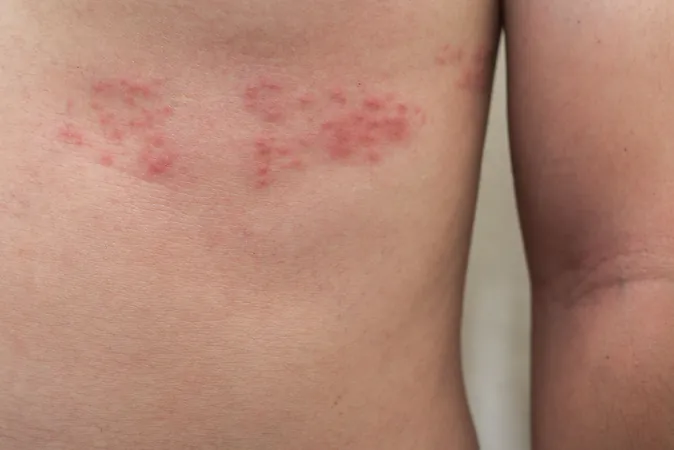
Breakthrough Study: Brivudine Outshines Traditional Antivirals in Treating Shingles!
2024-11-08
Author: Amelia
Introduction
A groundbreaking study has shed light on the safety and effectiveness of brivudine (BVDU, Zostex), a unique antiviral medication used in the fight against herpes zoster (HZ), commonly known as shingles. This 5′-halogenated thymidine nucleoside analogue has been licensed for HZ treatment, yet its safety data remained unclear until now.
Understanding Shingles
The varicella zoster virus (VZV), responsible for chickenpox, can lie dormant in the body for years, only to reactivate later and cause painful shingles. This condition results in blistering rashes and is estimated to affect about 0.2% to 2% of the general population. Timely intervention with antiviral therapies is crucial, as it can significantly reduce new lesion formation, accelerate healing, and minimize the risk of complications like postherpetic neuralgia (PHN).
Traditional Treatments
While common treatments for shingles include valaciclovir, acyclovir, and famciclovir, brivudine has shown remarkable promise. With 90% bioavailability and strong specificity for shingles, previous studies indicated brivudine's superior efficacy in pediatric cases compared to other antivirals. However, its performance in adult patients had been less definitive.
New Research Findings
To uncover the truth about brivudine’s effectiveness, researchers performed a meta-analysis involving data from seven randomized controlled trials (RCTs) and over 4,171 patients—2,095 treated with brivudine and 2,076 with other antivirals. The inclusion criteria were rigorous, ensuring that only relevant studies were analyzed for outcomes including efficacy, adverse reactions, and recovery times.
Dosage and Treatment Results
Patients in the brivudine group received a daily oral dose of 125 mg for one week, while those in control groups were treated with valacyclovir or acyclovir either orally or intravenously. The results were telling: brivudine not only resulted in shorter recovery times compared to traditional treatments but also showed significant improvements in clinical efficacy and reduced instances of PHN.
Safety Profile
Surprisingly, there were no notable differences in the adverse reactions experienced by patients across all treatment options, which is a strong indicator of brivudine’s safety profile.
Conclusion and Future Research
The study authors concluded that brivudine appears to be the more effective option for treating shingles, without the added burden of increased adverse risks. However, they emphasized the need for further research involving larger participant pools to corroborate these findings and make definitive recommendations.
Implications for Patients
As the prevalence of shingles continues to affect millions, this new evidence for brivudine’s efficacy could change the landscape of shingles treatment, providing hope for faster recovery and better patient outcomes. Don’t miss your chance to stay informed about the latest advancements in medical research that could significantly impact your health!









 Brasil (PT)
Brasil (PT)
 Canada (EN)
Canada (EN)
 Chile (ES)
Chile (ES)
 España (ES)
España (ES)
 France (FR)
France (FR)
 Hong Kong (EN)
Hong Kong (EN)
 Italia (IT)
Italia (IT)
 日本 (JA)
日本 (JA)
 Magyarország (HU)
Magyarország (HU)
 Norge (NO)
Norge (NO)
 Polska (PL)
Polska (PL)
 Schweiz (DE)
Schweiz (DE)
 Singapore (EN)
Singapore (EN)
 Sverige (SV)
Sverige (SV)
 Suomi (FI)
Suomi (FI)
 Türkiye (TR)
Türkiye (TR)